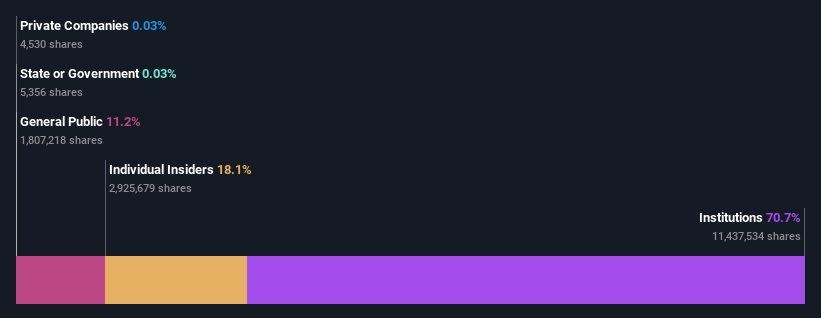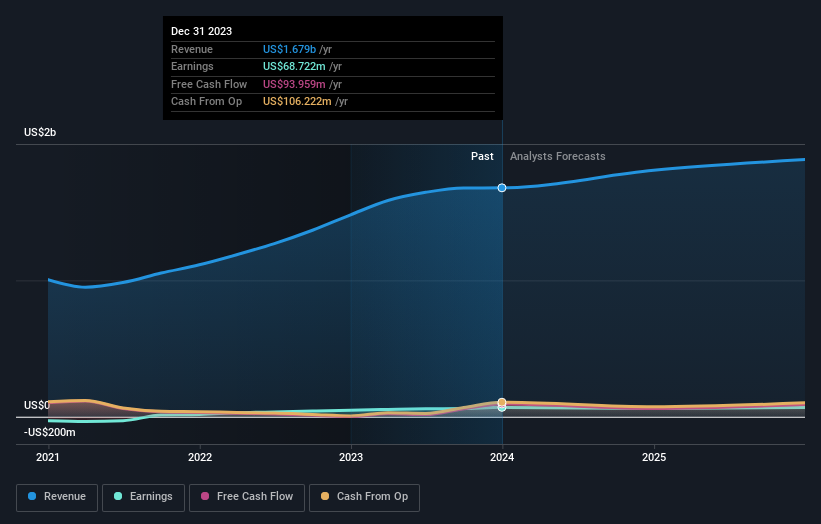Institutional investors have a lot riding on DXP Enterprises, Inc. (NASDAQ:DXPE) with 71% ownership
Key Insights
Given the large stake in the stock by institutions, DXP Enterprises' stock price might be vulnerable to their trading decisions
The top 8 shareholders own 51% of the company
To get a sense of who is truly in control of DXP Enterprises, Inc. (NASDAQ:DXPE), it is important to understand the ownership structure of the business. The group holding the most number of shares in the company, around 71% to be precise, is institutions. That is, the group stands to benefit the most if the stock rises (or lose the most if there is a downturn).
And as as result, institutional investors reaped the most rewards after the company's stock price gained 9.2% last week. The gains from last week would have further boosted the one-year return to shareholders which currently stand at 103%.
Let's delve deeper into each type of owner of DXP Enterprises, beginning with the chart below.
View our latest analysis for DXP Enterprises
What Does The Institutional Ownership Tell Us About DXP Enterprises?
Many institutions measure their performance against an index that approximates the local market. So they usually pay more attention to companies that are included in major indices.
DXP Enterprises already has institutions on the share registry. Indeed, they own a respectable stake in the company. This can indicate that the company has a certain degree of credibility in the investment community. However, it is best to be wary of relying on the supposed validation that comes with institutional investors. They too, get it wrong sometimes. When multiple institutions own a stock, there's always a risk that they are in a 'crowded trade'. When such a trade goes wrong, multiple parties may compete to sell stock fast. This risk is higher in a company without a history of growth. You can see DXP Enterprises' historic earnings and revenue below, but keep in mind there's always more to the story.
Investors should note that institutions actually own more than half the company, so they can collectively wield significant power. We note that hedge funds don't have a meaningful investment in DXP Enterprises. The company's largest shareholder is BlackRock, Inc., with ownership of 14%. Meanwhile, the second and third largest shareholders, hold 7.6% and 6.9%, of the shares outstanding, respectively. David Little, who is the second-largest shareholder, also happens to hold the title of Chief Executive Officer.
On further inspection, we found that more than half the company's shares are owned by the top 8 shareholders, suggesting that the interests of the larger shareholders are balanced out to an extent by the smaller ones.
While studying institutional ownership for a company can add value to your research, it is also a good practice to research analyst recommendations to get a deeper understand of a stock's expected performance. While there is some analyst coverage, the company is probably not widely covered. So it could gain more attention, down the track.
Insider Ownership Of DXP Enterprises
The definition of company insiders can be subjective and does vary between jurisdictions. Our data reflects individual insiders, capturing board members at the very least. Company management run the business, but the CEO will answer to the board, even if he or she is a member of it.
I generally consider insider ownership to be a good thing. However, on some occasions it makes it more difficult for other shareholders to hold the board accountable for decisions.
It seems insiders own a significant proportion of DXP Enterprises, Inc.. Insiders own US$153m worth of shares in the US$845m company. This may suggest that the founders still own a lot of shares. You can click here to see if they have been buying or selling.
General Public Ownership
The general public, who are usually individual investors, hold a 11% stake in DXP Enterprises. This size of ownership, while considerable, may not be enough to change company policy if the decision is not in sync with other large shareholders.
Next Steps:
It's always worth thinking about the different groups who own shares in a company. But to understand DXP Enterprises better, we need to consider many other factors. For example, we've discovered 3 warning signs for DXP Enterprises (2 are significant!) that you should be aware of before investing here.
If you would prefer discover what analysts are predicting in terms of future growth, do not miss this free report on analyst forecasts.
NB: Figures in this article are calculated using data from the last twelve months, which refer to the 12-month period ending on the last date of the month the financial statement is dated. This may not be consistent with full year annual report figures.
Have feedback on this article? Concerned about the content? Get in touch with us directly. Alternatively, email editorial-team (at) simplywallst.com.
This article by Simply Wall St is general in nature. We provide commentary based on historical data and analyst forecasts only using an unbiased methodology and our articles are not intended to be financial advice. It does not constitute a recommendation to buy or sell any stock, and does not take account of your objectives, or your financial situation. We aim to bring you long-term focused analysis driven by fundamental data. Note that our analysis may not factor in the latest price-sensitive company announcements or qualitative material. Simply Wall St has no position in any stocks mentioned.

 Yahoo Finance
Yahoo Finance 

